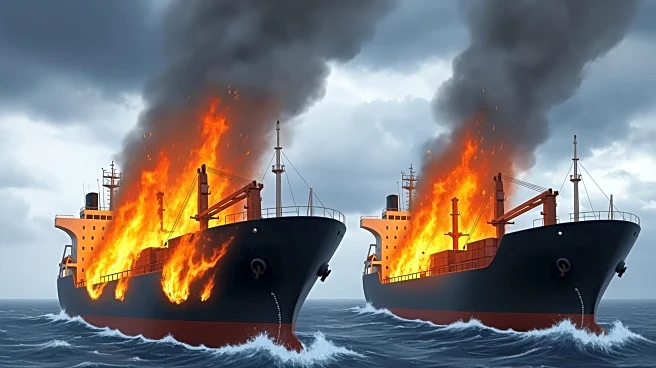What's Happening?
A fire aboard the containership Kyparissia at Malaysia's Port of Tanjung Pelepas resulted in the deaths of three individuals, including one crewmember, and injuries to three others. The fire, which occurred under deck in the fifth hold of the ship, was
initially fought by the port's fireboats and later assisted by the State Fire and Rescue Department. The vessel, owned by Costamare and chartered to Maersk, was discharging cargo when the explosion and subsequent fire occurred. The ship operates on a route that includes Onne, Nigeria, Cotonou, Benin, and Singapore, and is registered in Malta. Meanwhile, another Maersk vessel, Laust Maersk, is being held off Charleston, South Carolina, after smoke was detected in one of its cargo holds. The ship, registered in Singapore, had departed Charleston for Cartagena, Colombia, and is undergoing inspections and safety protocols.
Why It's Important?
The incidents highlight the ongoing risks associated with cargo fires in the shipping industry, which have been a significant concern due to misdeclared or poorly packed cargoes. The fatalities and injuries underscore the human cost of such incidents, while the operational disruptions affect Maersk's shipping routes and schedules. The industry is increasingly focusing on improving safety measures, including the use of AI to identify dangerous cargoes. These events may prompt further regulatory scrutiny and advancements in fire prevention technologies, impacting shipping companies, insurers, and global trade operations.
What's Next?
Maersk is working closely with authorities and the vessel owner to manage the situation and will provide updates as more information becomes available. The Laust Maersk is expected to berth once inspections are completed and approvals are given, allowing the discharge of affected containers. The industry may see increased efforts to develop new tools and technologies to prevent similar incidents, potentially influencing future shipping practices and safety standards.
Beyond the Headlines
The incidents may lead to a reevaluation of cargo handling and safety protocols within the shipping industry. Ethical considerations regarding the safety of crew members and the environmental impact of such fires could drive changes in industry practices. Long-term shifts may include enhanced training for crews and stricter regulations on cargo declarations.
















